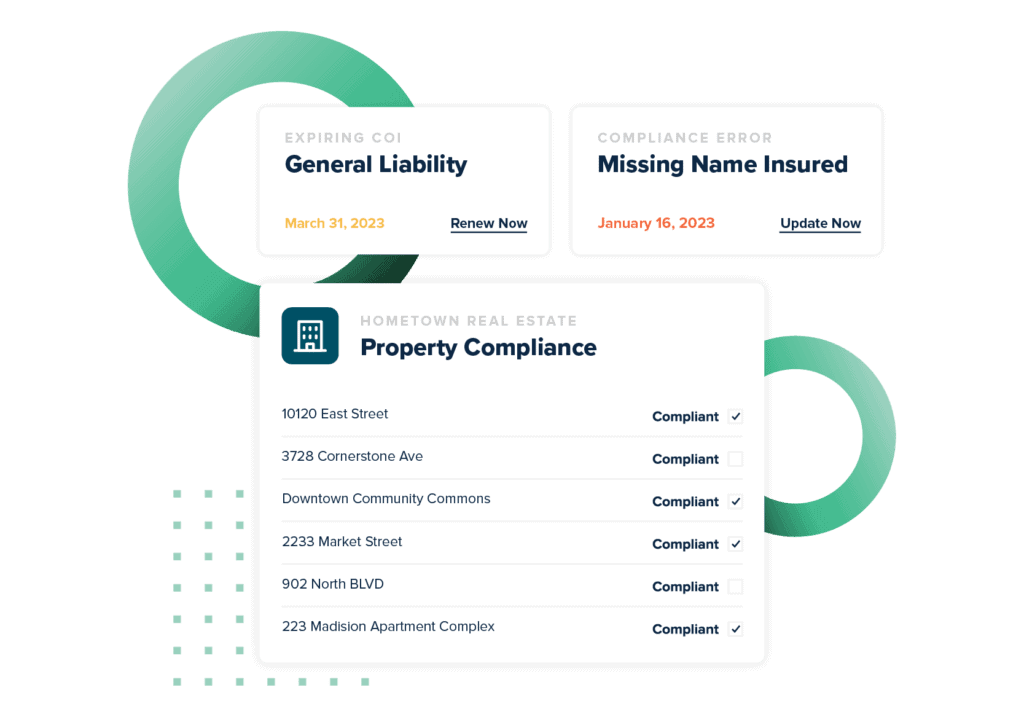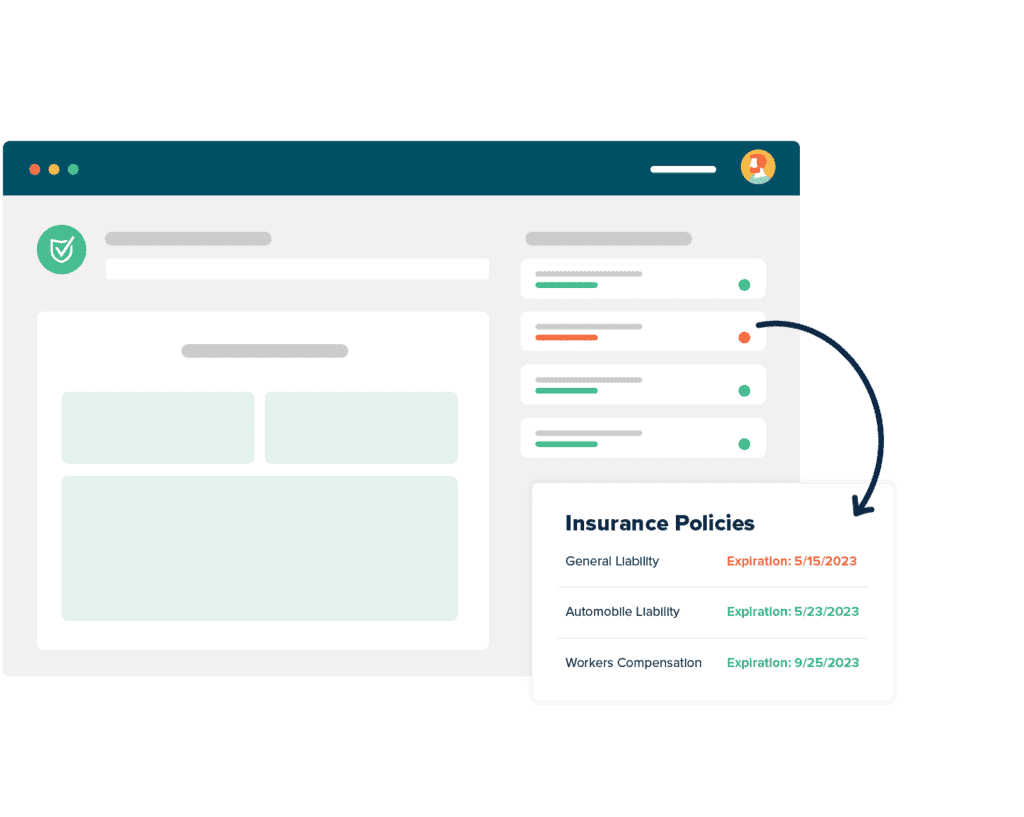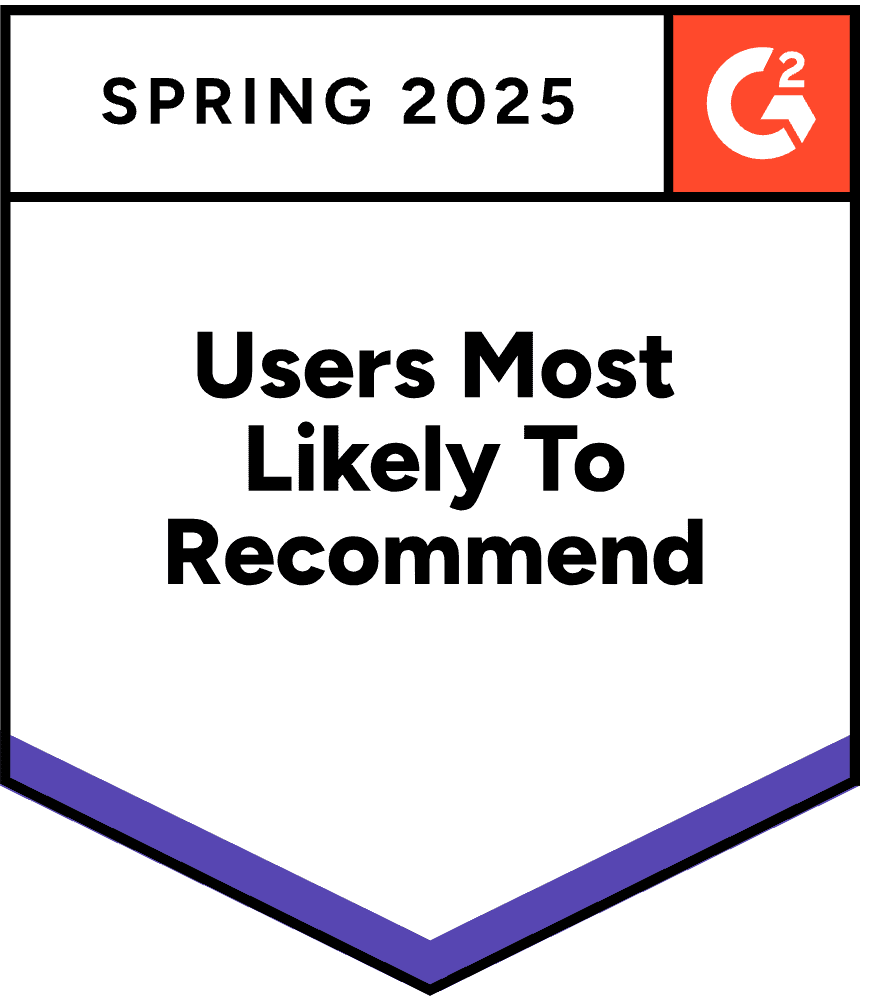Best Certificate of Insurance Tracking Software

Protect Your Business From Costly Claims
Ask your CFO or Risk Manager just how much claims and lawsuits can cost your business. If you are collecting certificates just to confirm they were received, you have no guarantee that your requirements are being met. myCOI Central is built on a foundation of insurance industry logic to ensure you remain protected with the appropriate coverage.
Automate Your COI Tracking
There’s no more need to worry about stacks of certificates cluttering up your office or hours of frustrating phone calls and emails to chase down certificates. myCOI Central provides your company with a solution to automate your insurance certificate requests, collection, and compliance resolution, while also giving your team a single, centralized repository to view compliance.


For Agents & Brokers
Win business and boost retention by providing agency branded, industry leading insurance tracking software to your insureds. Offer software only or add on your own compliance review services.
What Are The Benefits of COI Software?
View all CasesWhat Is Liability Insurance
Businesses that hire contractors or other third parties should make sure that all third parties they hire have the appropriate liability insurance. Liability insurance protects a business from claims resulting from damage or personal injury that falls within the coverage of the insurance policy. When a business hires a contractor, it is necessary for the business to ensure the third party has the appropriate liability insurance before hiring them. If an accident occurs on the job and the third party does not have general liability insurance coverage, the business that hired them would be held responsible for the accident.
General liability insurance coverage can provide protection against liability in case of an accident that results in injury or damages. Contractors must have liability insurance before they can be hired by a business, and it is the business’s responsibility to verify ahead of time that the contractor is in possession of a certificate of insurance. Risk managers at businesses that hire third parties should also check that contractors’ insurance policies include adequate coverage for the work being performed.
Here are a few common questions when dealing with general liability insurance coverage:
- What is liability insurance? – Liability insurance is a type of insurance policy that protects the insured party against legal claims filed in cases of injury or damage to property in which the insured was at fault.
- What is liability insurance coverage? – Liability insurance coverage may differ based on the specific policy, but liability insurance coverage for a business usually encompasses legal and financial obligations incurred as a result of personal injury or property damage that happened on the business’s property or for which the business was at fault.
- What is general liability insurance coverage? – General liability insurance is one of the most common kinds of liability insurance and can protect businesses against claims filed due to injury or damage to property. There are other kinds of insurance that may fall under the category of liability insurance as well.
Risk managers are responsible for managing certificates of insurance, typically from multiple contractors at once. A risk manager at a business that is working with a dozen contractors would have a dozen different certificates of insurance to verify and manage. This verification process can become very time-consuming when a business hires a large number of contractors. Using a certificate of insurance (COI) tracking solution like myCOI can help risk managers by making COI management much faster and simpler.
Liability Insurance For Contractors
It is very important for businesses to have liability insurance for contractors. General liability insurance for contractors ensures that the businesses that hire them are not held responsible for an accident. If a company hires a third party that does not have liability insurance, the hiring company would be responsible for injury or damages the contractor may cause while working for the company. This is why businesses can protect themselves by checking that the third parties they hire have the best general liability insurance for contractors.
By being careful only to hire third parties that have a certificate of insurance to prove they have general liability insurance for contractors, businesses can protect themselves against the risks of working with uninsured third parties. Risk managers can also help protect their company against legal action in the event of an accident by making sure the contractors they hire have not just any liability insurance but liability insurance with the necessary areas of coverage.
Professional Liability Insurance Companies
Risk managers at businesses that hire a lot of contractors might think they spend too much of their time managing certificates of insurance for their contractors. Since business liability insurance needs to change from time to time, risk managers should pay close attention to exactly what is covered by each contractor’s COI. Professional liability insurance companies may offer different liability insurance policies, so risk managers should carefully verify that each contractor’s liability insurance includes coverage appropriate for the work they will be doing. Risk managers need to be able to address new risk threats as they arise and resolve any issues they find with a contractor’s certificate of insurance.
One way to reduce the time and effort risk managers spend managing professional liability insurance for contractors is to use COI tracking software. A platform like myCOI is an example of COI management software that can handle everyday tasks related to managing certificates of insurance, which can allow businesses to rest assured that they are fully protected. If a risk manager fails to verify that a contractor is in possession of a COI and that it has the appropriate scope of coverage, they could expose the business to the risks of expensive litigation and failed insurance audits.
In addition to checking that each contractor’s business liability insurance exists and includes the proper coverage, risk managers may need to verify the COI’s validity with the insurer. If the insurance is not valid or there is a problem with the coverage, the risk manager may need to work with the contractor and the insurer to resolve the issue.
When a business is working with many different contractors, these COI management tasks can start to take up a great deal of time. Risk managers may find themselves struggling to keep up with the process of tracking down and verifying each contractor’s COI. Certificate of insurance management software like myCOI can help risk management specialists complete their COI verifications with greater accuracy and efficiency.
General Contractor Insurance Requirements
Risk managers should verify that third-party contractors are in possession of liability insurance, but they also should verify that the insurance policy provides the appropriate coverage. A policy that does not adequately cover the risks involved with the job might result in the business being held liable for injury or damage even though their contractor had insurance. It is especially important for general contractor risk managers to double-check their contractors’ insurance coverage because many contractors are insured with cheap general liability insurance for contractors.
Contractors will often try to find cheap liability insurance for contractors in order to save money. This is because it is not necessarily in their best interest to have anything other than the minimum required coverage. If they are over-insured, they would be paying for insurance they do not really need to have. That is why it is the responsibility of the business that contracts them to make sure they have comprehensive general liability insurance that provides appropriate coverage for the task at hand and to address the issue if the coverage is not adequate. Businesses will have an easier time managing multiple COIs and the details of their coverage by implementing an automated COI tracker like myCOI.
Professional Liability Insurance
Professional liability insurance is another type of liability insurance. Professional liability insurance for consultants can protect against additional claims such as negligence or copyright infringement. While general liability insurance typically protects against physical harm or damage, professional liability insurance usually covers cases of negligence on the part of a business. It is important for contractors to have professional liability insurance as well as general liability insurance in order to protect the businesses that contract them for work.
Sometimes professional liability insurance is called errors and omissions insurance, but professional liability insurance and errors and omission insurance are essentially the same. Errors and omissions insurance is one common type of professional liability insurance.
What does professional liability insurance cover for a business? Professional liability insurance for consultants could potentially protect the businesses that hire them in a variety of scenarios. There are different kinds of professional liability insurance that cover different types and degrees of risk. No matter what industry a business operates in and what the work entails, if it hires contractors, it probably needs a way of verifying that contractors hold the appropriate professional liability insurance policies.
Types Of Professional Liability Insurance
There are different types of professional liability insurance that provide different kinds of coverage. These types of professional liability insurance can protect businesses against varying levels of risk. Professional liability insurance examples include medical professional liability insurance. This type of insurance is very different from other types of professional liability insurance like errors and omissions insurance.
If a company does not ensure that the third-party contractors and consultants they hire possess the necessary certificates of insurance, the company could be held responsible for negligence on the part of the contractor or consultant. It is usually necessary for businesses to verify the type of coverage held by their contractors or consultants prior to beginning work. This can ensure that the business is protected if a third party they hired makes a costly mistake.
Tracking and verifying COIs efficiently can be a challenge when a business works with a lot of third parties at once. Risk managers will complete the verification process much more quickly and efficiently by using COI management software like myCOI. Automating the process of managing certificates of insurance could help risk managers streamline their workflow and save time, which can be reclaimed for other important tasks.









